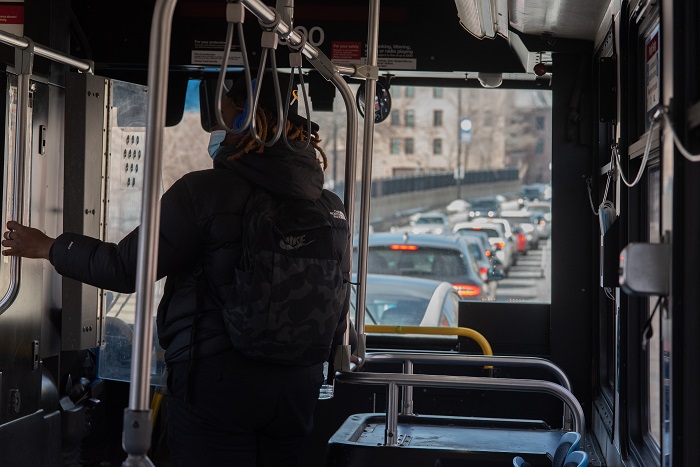The Active Transportation Alliance is part of the Safe Streets for All, Transit That Works coalition that is working to educate Chicago voters for the municipal elections on February 28 and April 4.
The coalition developed a platform based on concerns and wishes for Chicago’s transportation landscape. While the platform covers a range of topics surrounding sustainable transportation, two of the top concerns of the platform are unreliable bus and rail service and slow bus service.
Given the CTA operator shortage, it’s crucial for the CTA to attract and retain new transit operators. The Safe Streets for All, Transit That Works election platform recommends better compensation and schedules that allow for operators to have a healthier work-life balance. Providing restrooms along bus routes will also support operator health and well-being.
For too long, buses have been the forgotten sibling of trains. Despite the fact that buses carry the bulk of CTA passengers, CTA buses have to slog through mixed traffic at an average speed of 10mph.
Despite candidates in the 2019 mayoral race (including Mayor Lori Lightfoot) promising to increase bus-only lane mileage, Chicago is woefully behind other major U.S. cities when it comes to bus-only lane mileage. The next mayor and the next Chicago City Council need to prioritize buses.
Once the system has the necessary number of operators, we need to invest in bus-only lanes and updated traffic signals that can prioritize CTA buses.
Giving priority to buses is an equity issue. Black people and Brown people in Chicago are more likely than white people to count on public transit — especially buses — as their primary way of getting around. As a result, investments in upgrading our bus system have a greater positive impact for communities of color.
Additionally, we can’t meet our climate goals without replacing driving trips with transit, walking, and biking. The best strategy to get people out of their cars and onto a bus is to make using the bus faster than driving. We can only do that by prioritizing buses on our streets.
Decisions made within the mayor’s office and the city council have an impact on the CTA:
- The mayor of Chicago appoints four out of the seven Chicago Transit Board members.
- The Chicago Transit Board appoints the head of the CTA and approves the budget for the CTA and any projects the CTA would like to carry out.
- The mayor and city council oversee the Chicago Department of Transportation, which has control over Chicago’s streets.
If we want more bus-only lanes and traffic lights that favor buses, we need leadership in city council to fund these necessary infrastructure changes and empower the CDOT to make them.
Last year CTA and CDOT launched a planning process called Better Streets for Buses that aims to improve the speed and reliability of bus service. The agencies solicited public feedback for creating the plan and hope to finalize it soon.
We need people like you to help shape this community-informed plan. We need to make sure the plan focuses on proven methods for speeding up bus service and increasing reliability: dedicated bus lanes and bus rapid transit. The Better Streets for Buses planning process developed between the CTA and the CDOT provides a path forward. Let’s vote for candidates who will make that plan come to fruition.
WHERE DO YOUR CANDIDATES STAND?
On January 28, the Safe Streets for All, Transit That Works campaign offered Chicago mayoral candidates the opportunity to describe how they would respond to our growing traffic safety crisis and the many challenges confronting our transit system.
About 200 people who attended the live event and many hundreds more who watched the recording heard from the candidates on everything from improving CTA reliability to their views on building a network of protected bike lanes.
Thanks to the efforts of more than 40 volunteers, each candidate for alderperson in every Chicago ward and each mayoral candidate was asked to complete a candidate questionnaire. Be sure to take a look at the candidate responses.

